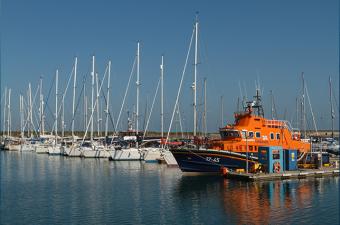
OVERVIEW
The Court of Appeal today handed down judgment in Holyhead Marina v Farrer [2021] EWCA Civ 1585, upholding the decision of Mr Justice Teare that a marina counts as a “dock” for the purposes of section 191 of the Merchant Shipping Act 1995, and is therefore entitled to limit its liability under that section. Nigel Cooper QC appeared for the Appellants leading James Watthey instructed by Daniel Crockford at Ince; Robert Thomas QC and Benjamin Coffer appeared for the Respondent instructed by Emma Rice at Clyde & Co.
On 1 and 2 March 2018, a severe storm known as ‘Storm Emma’ caused very substantial damage to Holyhead Marina, including the break-up and detachment of the floating elements of the Marina itself. The storm, and the resulting break-up of the Marina, caused loss and damage to yachts and other ships which were present in and around the Marina at the time.
The owners of the Marina sought a general decree that they were entitled to limit their liability under section 191 of the 1995 Act, which grants “the owners of any dock or canal” a right to limit their liability similar to the right of a shipowner under the 1976 Limitation Convention. The liability of the dock or canal owner is limited by reference to the tonnage of the largest UK ship which has been within “the area over which the authority or person discharges any functions” at any time within the last five years. “Dock” is given a wide meaning by section 191(9) to include “wet docks and basins, tidal docks and basins, locks, cuts, entrances, dry docks, graving docks, gridirons, slips, quays, wharves, piers, stages, landing places and jetties.”
The owners of yachts which were damaged by Storm Emma resisted the right to limit, arguing that the Marina was not a “dock” for the purposes of section 191 and that the Claimant was therefore not entitled to the benefit of the section. At first instance, Mr Justice Teare accepted that although the Marina was not a “dock” on the natural meaning of that word, the floating pontoons which comprised the Marina could properly be described as a landing place, jetty or stage (but not a “pier”). Lord Justice Flaux granted the yacht owners permission to appeal.
On appeal, the yacht owners argued that while the individual elements of the Marina might constitute landing places, jetties or stages the Marina as whole could not be described as a single landing place, jetty or stage so as to entitle the Marina to limit liability. They further argued that the logical consequence of the Judge’s analysis was that there ought to have been that there was a separate limitation fund available in respect of each floating pontoon or combinations thereof. The yacht owners also suggested that the right to limit was primarily intended to encourage commercial shipping, and should therefore not be extended to structures used primarily by leisure craft unless those structures fell clearly within the natural and ordinary meaning of the terms used by the section. The yacht owners also made the point that if marinas can limit liability insurance premiums for yacht owners could rise.
The Court of Appeal upheld the first instance judgment, which the Master of the Rolls described as “excellent” and “erudite”. The Court agreed that the Marina was not a “dock” on the ordinary meaning of that term, but held that it could properly be described as a “landing place”. The suggestion that each pontoon should have its own limitation fund would lead to an absurdity. The Court agreed with the judge that there was no justification for excluding structures used primarily by leisure craft from the section. Males LJ pointed out that the terms used in section 191 are not used in a technical sense, and that there is considerable overlap between them. The Judge had “reached a common sense conclusion which was clearly correct.”



